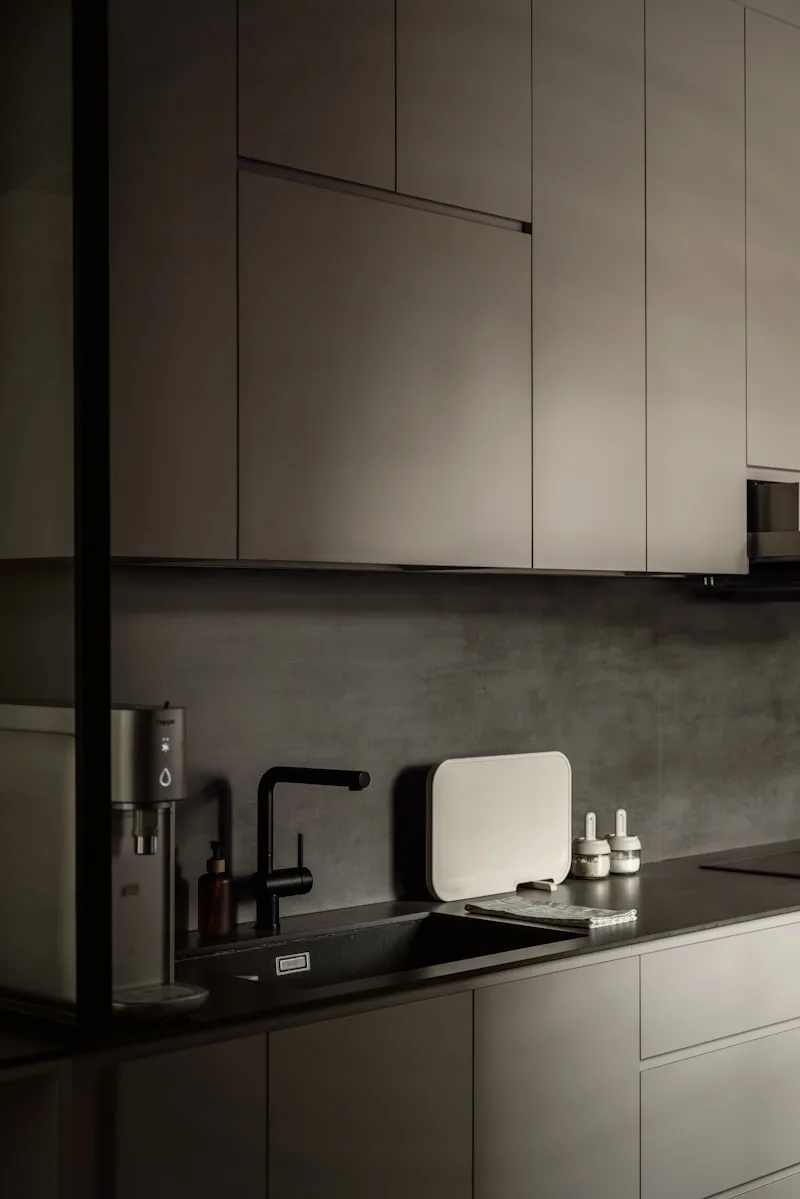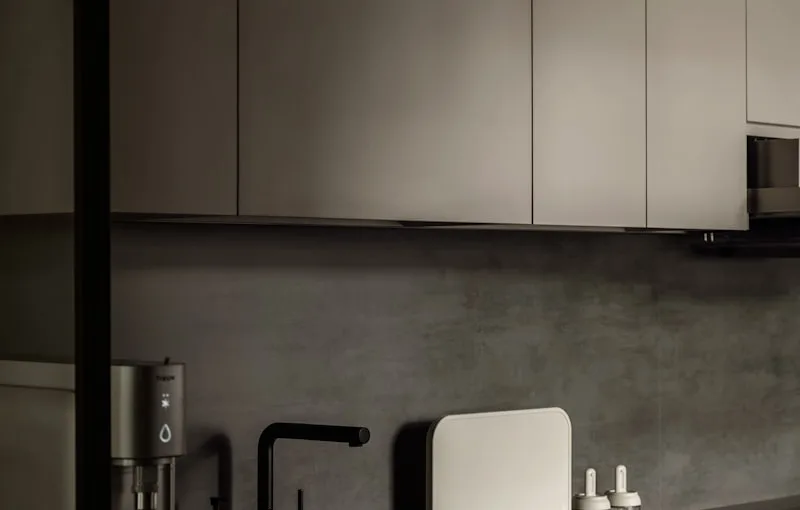First off, let’s talk about the magic of warm, soapy water. It’s like a gentle hug for your cabinets! Just mix a few drops of dish soap with warm water, grab a soft cloth, and start wiping. This method is perfect for everyday cleaning and won’t harm the finish. But what if you’re dealing with stubborn stains or sticky spots? That’s where a mixture of vinegar and water comes into play. It’s like a superhero duo—vinegar cuts through grease while being safe for most cabinet materials. Just remember to test it on a small area first, like a secret handshake!
Now, if your cabinets are made of wood, you might want to consider using a specialized wood cleaner. Think of it as a spa day for your cabinets! These cleaners nourish the wood and help maintain its shine. And don’t forget about microfiber cloths—they’re like the ninjas of the cleaning world, picking up dust and dirt without scratching surfaces.
For those tough, baked-on messes, a baking soda paste can work wonders. Just mix baking soda with a little water, apply it to the problem area, and let it sit for a few minutes. It’s like giving your cabinets a mini facial! Rinse it off, and voilà—clean cabinets that look brand new. So, whether you’re tackling everyday grime or deep cleaning, there’s a perfect solution waiting for you!
The Ultimate Guide: Top 5 Cleaners for Sparkling Kitchen Cabinets
First up, we have the classic vinegar and water solution. This dynamic duo is like Batman and Robin for your cabinets. Just mix equal parts of vinegar and water in a spray bottle, and you’ve got a natural cleaner that cuts through grease and grime without any harsh chemicals. Plus, it’s super affordable!
Next, let’s talk about baking soda. This little powerhouse is not just for baking! Create a paste with water and baking soda, and you’ve got a gentle abrasive that can tackle tough stains. It’s like giving your cabinets a spa day—scrubbing away the dirt while being kind to the surface.
If you’re looking for something a bit more commercial, consider a citrus-based cleaner. These products are not only effective but also leave your kitchen smelling like a sunny day. They break down grease effortlessly, making your cabinets look brand new.
For those who prefer a more luxurious touch, try a wood-specific cleaner. These are formulated to nourish and protect your cabinets, ensuring they stay beautiful for years. Think of it as a moisturizer for your wood!
Last but not least, microfiber cloths are your best friends in this cleaning journey. They trap dust and dirt like a magnet, making it easy to wipe down your cabinets without scratching them. It’s like having a tiny cleaning army at your disposal!
Natural vs. Chemical: What’s the Best Way to Clean Your Kitchen Cabinets?

Imagine your kitchen cabinets as a canvas. Natural cleaners are like soft pastels, perfect for those who want to maintain the integrity of their surfaces while still getting the job done. They’re safe for your family and pets, and they won’t leave behind harsh chemical residues. Plus, who doesn’t love the fresh scent of lemon or the earthy aroma of essential oils wafting through the air? It’s like a spa day for your kitchen!
Now, let’s talk about the chemical cleaners. Think of them as the heavy-duty tools in your cleaning arsenal. They’re designed to tackle tough stains and sticky messes that natural cleaners might struggle with. If you’ve ever faced a stubborn grease spot that just won’t budge, you know the feeling of desperation. Chemical cleaners can be your knight in shining armor, swooping in to save the day. But, there’s a catch—these powerful solutions can sometimes be harsh on your cabinets and may emit strong fumes that aren’t exactly pleasant.
So, what’s the best way to clean your kitchen cabinets? It really boils down to your priorities. Are you looking for a gentle touch that’s safe for your home, or do you need the muscle to fight off tough stains? It’s like choosing between a cozy sweater and a sleek leather jacket—both have their place, but it all depends on the occasion.
DIY Solutions: How to Make Your Own Effective Kitchen Cabinet Cleaner
Imagine this: a cleaner that’s not only effective but also safe for your family and the environment. All you need are a few simple ingredients you probably already have in your pantry. Start with a cup of warm water, add a tablespoon of white vinegar, and a few drops of dish soap. Mix it all together, and voilà! You’ve got a powerful cleaner that cuts through grease and grime like a hot knife through butter.
Now, let’s talk application. Grab a microfiber cloth—trust me, it’s a game-changer. Dip it into your homemade solution, wring it out, and start wiping down those cabinets. You’ll be amazed at how easily the dirt lifts away. It’s like watching a magic trick unfold right in your kitchen! And if you encounter stubborn spots, just let the solution sit for a minute before wiping. It’s like giving your cabinets a mini spa day.
But wait, there’s more! If you want to add a fresh scent to your cleaner, consider tossing in a few drops of your favorite essential oil. Lemon or lavender can transform your cleaning routine into a delightful experience. Plus, it’s a great way to keep your kitchen smelling fresh and inviting.
From Grease to Grime: The Best Products for Reviving Your Kitchen Cabinets
First up, consider a good degreaser. Think of it as your kitchen’s superhero, swooping in to save the day. A powerful degreaser can cut through that stubborn grease like a hot knife through butter. Just spray it on, let it sit for a few minutes, and watch the magic happen. You’ll be amazed at how easily the grime lifts away, revealing the fresh surface underneath.
Next, you might want to grab a gentle cleaner. This is your trusty sidekick, perfect for everyday maintenance. Look for something that’s safe for wood and won’t strip away the finish. A simple mix of warm water and mild dish soap can work wonders. It’s like giving your cabinets a refreshing spa day—clean, rejuvenated, and ready to shine!
Now, if your cabinets are looking a bit dull, a good polish can bring back that luster. Think of it as a little pick-me-up for your kitchen. A quality wood polish not only enhances the color but also adds a protective layer, keeping future grime at bay. Just a few swipes with a soft cloth, and you’ll see your cabinets gleam like they just stepped out of a magazine.
And let’s not forget about the power of a good scrub brush. Sometimes, a little elbow grease is all you need. It’s like giving your cabinets a workout, scrubbing away years of neglect. Just remember to be gentle, especially on painted surfaces, to avoid any damage.
With these products in your arsenal, your kitchen cabinets will be ready to shine brighter than ever!
Expert Tips: How to Choose the Right Cleaner for Your Kitchen Cabinet Material
First off, consider what your cabinets are made of. Are they wood, laminate, or maybe even metal? Each material has its quirks. For instance, wood cabinets love a gentle touch. Think of them as a delicate flower; harsh chemicals can strip away their natural beauty. Instead, reach for a mild soap mixed with warm water. It’s like giving your cabinets a refreshing spa day!
Now, if you’ve got laminate cabinets, you’re in luck! They’re a bit more forgiving. You can use a multi-surface cleaner without worrying too much. Just imagine it as a trusty sidekick that helps you tackle those stubborn stains. But remember, avoid anything too abrasive—think of it as using sandpaper on your favorite shirt. Ouch!
And what about those sleek metal cabinets? They can be a bit high-maintenance. A gentle cleaner specifically designed for stainless steel will do wonders. It’s like giving them a shiny new coat of armor, making them look brand new again. Just remember to wipe in the direction of the grain to keep that shine intact.
So, next time you’re gearing up for a cleaning spree, take a moment to think about your cabinet material. Choosing the right cleaner is like finding the perfect recipe; it makes all the difference in the world!
Cleaning Kitchen Cabinets: The Do’s and Don’ts You Need to Know
First off, do gather your supplies. You’ll need a gentle cleaner, microfiber cloths, and maybe a little baking soda for those stubborn spots. Think of your kitchen cabinets as a canvas; the right tools will help you create a masterpiece. When you start cleaning, do work from the top down. It’s like painting a wall—if you start at the bottom, you’ll just end up with drips and splatters everywhere!
Now, here’s a big don’t: avoid harsh chemicals. Your cabinets are like your favorite pair of jeans; you wouldn’t want to ruin them with something too abrasive. Stick to natural cleaners whenever possible. Vinegar and water can work wonders, and they’re safe for most finishes.
Another do is to pay attention to the hardware. Those knobs and handles can collect grime like nobody’s business. A quick wipe-down can make a world of difference. And don’t forget to check the corners and crevices—those little nooks can hide a lot of dust bunnies!
On the flip side, don’t forget to dry your cabinets after cleaning. Leaving them damp is like leaving a wet towel on the floor; it just invites trouble. A quick buff with a dry cloth can prevent water spots and keep your cabinets looking fresh.
So, roll up your sleeves and get ready to transform your kitchen! With these do’s and don’ts in your back pocket, you’ll be well on your way to cabinet-cleaning success.
Frequently Asked Questions
Can I Use Vinegar to Clean Kitchen Cabinets?
Vinegar is an effective and natural cleaner for kitchen cabinets. It helps remove grease, grime, and stains without harsh chemicals. To use, mix equal parts of vinegar and water in a spray bottle, apply to the cabinets, and wipe with a soft cloth. Always test on a small area first to ensure compatibility with the cabinet finish.
What Cleaning Products Are Safe for Kitchen Cabinets?
When cleaning kitchen cabinets, it’s important to use products that are safe and effective. Look for gentle, non-toxic cleaners such as mild dish soap mixed with water, vinegar, or baking soda. Avoid harsh chemicals and abrasive materials that can damage the finish. Always test a small, inconspicuous area first to ensure compatibility.
What Tools Are Best for Cleaning Kitchen Cabinets?
To effectively clean kitchen cabinets, use a combination of soft cloths, sponges, and non-abrasive cleaners. For grease and grime, a mixture of warm water and mild dish soap works well. Microfiber cloths are ideal for dusting and polishing. For stubborn stains, consider using a gentle all-purpose cleaner or a vinegar solution. Always test any cleaner on a small, inconspicuous area first to avoid damage.
How Do I Remove Grease Stains from Kitchen Cabinets?
To effectively remove grease stains from kitchen cabinets, start by mixing warm water with a few drops of dish soap. Use a soft cloth or sponge to gently scrub the stained area, rinsing frequently with clean water. For tougher stains, a mixture of baking soda and water can be applied as a paste. Let it sit for a few minutes before wiping it away. Always test any cleaning solution on a small, inconspicuous area first to ensure it does not damage the finish.
How Often Should I Clean My Kitchen Cabinets?
Regular cleaning of kitchen cabinets is essential for maintaining hygiene and appearance. It is recommended to clean them at least once a month to remove dust, grease, and stains. For high-traffic areas or if you cook frequently, consider cleaning them bi-weekly. Additionally, deep cleaning should be done every six months to ensure longevity and prevent buildup.
